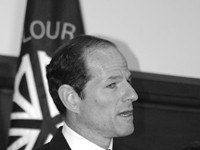Slaughter House Rules
A Rochester politician leads the charge to clean up the House of Representatives
By Krestia DeGeorge[
{
"name": "500x250 Ad",
"insertPoint": "5",
"component": "15667920",
"parentWrapperClass": "",
"requiredCountToDisplay": "1"
}
]
It's mid-November, not long after the midterm Congressional election. The sun is shining in Fairport, but it's cold out, the first real cold snap to threaten the long Indian summer.
Louise Slaughter is home and is recovering from a bout with the shingles. But she's about to head one of the most powerful committees in the House of Representatives. So despite her lingering illness, she's moving around the house, fixing sandwiches, answering her persistent BlackBerry, and keeping one eye on a television set tuned to CNN. All the while, she manages to keep up a brisk conversation.
Come January, Slaughter will chair the House of Representatives' Committee on Rules. You could be forgiven for wondering what the Rules Committee is, and the committee's own web site isn't much help. Its home page boasts, front and center, a list of "Recent Actions" including, last week, this gem:
"Text of H.R. 6346 --- To extend certain trade preference programs, to authorize the extension of nondiscriminatory treatment (normal trade relations treatment) to the products of Vietnam, to modify temporarily certain rates of duty and make other technical amendments to the trade laws, and for other purposes."
But the Rules Committee doesn't debate policy. So what the committee did with H.R. 6346 had nothing to do Vietnam or trade. What it did was to set a one-hour limit on debate and to decide that amendments couldn't be added to the bill on the floor of the House.
Paying this kind of fastidious attention to the intricate details about how a law can be considered --- whether amendments can be added, how long bills can be debated and under what circumstances --- is exactly what the House Committee on Rules does.
It's like C-SPAN on Quaaludes. Policy for a policy wonk's wonk. But Slaughter is happy wading into the arcana of parliamentary procedure on our behalf. She not only talks about the significance of the Rules Committee in today's world, but she also wants to impart her own fondness for the institution, starting with its history. It was founded, she explains, in 1787.
"It's one of the earliest and oldest committees in the House," she says. "It was decided by the founding fathers that there needed to be a place for legislation to go to determine whether it was ready to come to the floor to be voted on."
She details how John F. Kennedy and Lyndon Johnson got the number of members of the committee increased to circumvent a chairman from Virginia, one Howard Smith, who was blocking their civil-rights legislation.
She's in the middle of explaining how Rules is one of only a handful of "exclusive committees" (you can't sit on Rules and, say, the Agriculture Committee), when, perhaps, catching a glimpse of the glaze forming on this reporter's eyeballs, she interrupts herself.
"It's esoteric as all get-out," she says, and then quickly adds: "But it's critically important. It's always called 'the powerful Rules Committee.'"
That power, though, has eroded under the presidency of George Bush. Or rather, says Slaughter, it's been ceded to the president without much of a fight.
"It's lost a lot of power, as everything has under the Republicans," she says. "They've given away most of their own power to George Bush. We are in the process of bringing back some people from the past who served on Rules and were really good at it, and seeing how we can restore it to its former glory."
The entire legislative branch of government has generally been on the losing side of a struggle over the balance of power and the Constitution's system of checks and balances. But even before the Democratic-led Senate and House of Representatives push to regain their authority, they'll need to put their own houses in order. That begins at the start of the term, when each house sets the rules its members must abide by. Because she's chair of the Rules Committee, Slaughter will be in charge of this unglamorous but important job. If anything, it'll be more important this time around, given how prominently corruption scandals figured into the Democrats' sweep of both houses of Congress.
To prove they're serious about reform, the Dems will have to enact rules in the opening sessions of Congress that are tough, credible, and enforceable. Does the party have the political will to adopt tough reform? In the House of Representatives, the answer will come in the form of the rules package that Slaughter will introduce at the session's opening. That means that Slaughter is cast in the role of Nancy Pelosi's enforcer.
She'll have her work cut out for her.
The 109th Congress (the one that is just wrapping up this month) has been among the tawdriest in recent memory. One of its members, Randy "Duke" Cunningham, is in jail for accepting lavish bribes. Another, Ohio Congressman Bob Ney, is headed there after pleading guilty to taking gifts from über-lobbyist Jack Abramoff. Montana Senator Conrad Burns, on the defensive for similar activities, lost his seat in the Senate, previously considered a safe one. Abramoff himself is in jail, and former House Majority Leader Tom DeLay, influential in coordinating the lobbyist-congressional complex, resigned after being indicted.
(The Democrats haven't been free of the taint that's infected Washington, either. Louisiana's William Jefferson is in the middle of a bribery investigation; the FBI found $90,000 in cash in his freezer. But Jefferson won reelection in a run-off last Saturday.)
Despite the magnitude of the corruption, Slaughter is undaunted. In fact, she almost seems to light up at the prospect of enacting the reforms she and other Democratic leaders have drawn up.
One of the top items on her list: "There will be no flying around on corporate jets. We see no reason why a member of Congress should fly on somebody's corporate jet, giving them free access to them for a couple of hours or more. So they can't do that," she says. Pausing for a second, she adds, in a quieter voice: "I'm going to have a lot of trouble with that."
Why's that?
Because members of Congress love the plane rides, she says. "But you know, it's not right; it's not fair; that's access to them only. We've had way too much of that." This reflective moment lasts only a second, and Slaughter's back to rattling off more reforms: "Also, we can't take meals or gifts from the lobbyists."
And she's particularly excited about requiring more disclosures as part of the earmark process. Earmarks are additions to appropriations bills that specify where the money will go, either giving it straight to outside groups or directing federal agencies to spend it in a specific way. Pork-barrel spending, in other words.
In the past, this has been an easy way for members of Congress to help themselves or their campaign contributors without attracting attention.
"We had members this time," Slaughter says, "who literally had earmarks in to benefit themselves, to build roads up to some malls they owned, take care of their brother. It was awful."
Instead of trying to cobble together complicated legislation to curb conflicts of interest --- legislation that would likely wind up full of loopholes --- Slaughter's earmark reform takes a different tack. She's pushing to get out into the open any information that might expose a conflict of interest. The idea is that public embarrassment will be a sufficient deterrent.
Under the proposed reforms, "you have to first announce anything about that earmark that benefits you as a member of the House," says Slaughter. "Then you have to say anything in the earmark that benefits anybody even tangentially related to you or anyone with whom you are in business. And then you have to get a sign-off from the chairs of both the authorizing and appropriating committee," she says. "So we think that by the time they get through, it's probably a pretty good idea that this is not a 'Bridge to Nowhere.'"
Another reform she's positively anxious to speak about: spouse privileges.
"We have to do something about spouses," she says. "A spouse gets a pin that allows them into almost any place in the world that they want to go in the Capitol. And yet a lot of the spouses are lobbyists, and they should not be in those meetings."
Her solution: "If they're working as a lobbyist, that spouse pin is null and void on them."
As with other reforms, Slaughter knows she'll get push-back from her colleagues on this one.
"The argument we always get on that is: 'You're a woman. We want women to work. Don't you want women to work?'" As she recites this, Slaughter's voice steadily decreases into a mock whine. Then, adopting the patient but firm tone of a parent, she responds: "Yeah. But I do want them to follow rules."
Slaughter's enthusiasm for this kind of reform seems almost boundless. Asked at one point if there were other reforms that might surface, she replies: "Yes. Every day we think of more that we have to do."
But there are two potential obstacles to Slaughter's ambitious agenda. The first is that these rules changes could be adopted, then promptly be rendered irrelevant when no one enforces them. Slaughter already has a plan to try to ensure that doesn't happen.
"We want to set up an office of compliance," she says. "We're going to set up a lot of rules to clean up, but we know that somebody has to be there to make sure that compliance takes place."
The second, more ominous problem is that her own Democratic colleagues will be tempted to water down or outright vote against the tough new measures she plans to put forth. After all, many in the Democratic leadership are themselves creatures of the insider culture of Washington, familiar and comfortable with the way business gets done in that town.
Asked whether she anticipates trouble getting members of her own caucus to go along with her measures, she replies: "I think so. Yes, I believe we will."
What she doesn't believe is that there'll be enough opposition to derail the package of reform rules.
"I'm just going to say to them: 'Look [how] we got elected. Six out of 10 people said their vote had a lot to do with corruption. And we're going to clean this up, and you better get on board. And you either came here to fly around on jets or pass legislation, one of the two,'" she says.
If that's not enough, she says, she's always got the firm backing of the most powerful politician in the new House of Representatives, incoming Speaker Nancy Pelosi.
As an example, she cites a struggle over some of the reforms.
"It had all this crap in there about jets and you could go pay first class, or you could do this and that, or you could fly twice," she says.
"I just happened to catch her eye," says Slaughter. "I said, 'Nancy, we can't carry this corporate jet thing. This is too heavy; we don't want that.'"
With a sweep of her arm, a gesture Slaughter recreates, Pelosi acceded to her request and let Slaughter know she had her support.
Slaughter's close working relationship with Pelosi should be an advantage in her other, more private task of running the Rules Committee. While it's not as visible as correcting the corruption problems, a smoothly --- and more importantly, openly --- functioning Rules Committee is important to a successful democracy, Slaughter says.
The Rules Committee, unlike other federal committees, doesn't hold typical public hearings on issues. The only people who go before it are other members of the House who want to amend existing bills. It's the Rules Committee that approves or denies their requests. A well-run Rules Committee can help enable Congress do what it does best: use the collective wisdom of members to craft sound policy.
Not surprisingly, that power can also be used to thwart good policy and silence members of the minority party. Slaughter says that's what happened under the tenure of the outgoing chair, Republican David Dreier of California. She points to an 18-page report she prepared called "America for Sale: The Cost of Republican Corruption."
Among other things, the report includes lists of amendments to a few important bills that weren't allowed to be added. An amendment to the energy bill proposed by a Republican representative, for example, would have extended a tax rebate on hybrid vehicles. Another, from a Democratic Congressman, asks the president to file a complaint about OPEC's trade practices to the World Trade Organization.
The list goes on for six pages and includes amendments from both sides of the aisle. These weren't proposed changes that were voted down by members of Congress. They simply were never allowed to be considered.
It's a measure of the culture of Washington during the 109th Congress that Dreier pressured Slaughter to remove the report, produced by the Rules Committee staff, from her official House website. She refused.
Why would he do something like that?
"He's a prick," she says.
Even other Republicans have complained about the way that "they'd shut the House down," says Slaughter. She paraphrases one of those Republicans, former House Speaker Newt Gingrich: "He said, 'You know, you can't hold people with your foot on their neck like that all the time and expect them to help you out or join with you on anything.'"
"When Democrats were still in charge and had the majority, we would give amendments to Republicans. And I plan to do that again," says Slaughter. "What's been happening there is that half the population of the United States has been shut out."
In addition to blocking some amendments, Slaughter says her predecessor ran the committee in a way that favored certain controversial bills that Republican leaders wanted passed.
"What they've been doing now is if we have a tough bill, we have the hearing," she says. "People come to the hearing; they talk before us with their amendments. Then we often recess and come back hours later. And what they'll do is go out and beat votes out of people and put whatever they need in there to get people to vote, so that they've rewritten the bill by the time that we get back up. Well, we're not allowing that."
The Rules Committee reforms include even seemingly small things like what time of day the committee meets. The committee schedule under Dreier clearly peeved Slaughter.
Often, she complained, the committee wouldn't even meet until 10 o'clock at night. Then meetings would run through midnight, and often members would get called back at 1 or 2 in the morning, she says.
All the nitty-gritty of reform aside, Slaughter and in fact all her fellow Democrats face one more hazard. In their zeal to use their new power to make big changes, they risk extending the bitter partisanship that's marked the last several years in Congress. If that happens, they could wind up creating a Democratic version of the closed government Slaughter deplores. Will Democrats be able to take power in a way that diminishes partisanship?
"I hope so, but I have to tell you...," Slaughter begins, before pausing to start again. Democrats won't travel the path of impeaching the president, she says --- "We've got no time for that" --- but they will hold a lot of hearings. It's clear from her language as she struggles to answer the question, that this could be the Democrats' most difficult problem.
"We're not going to spend a lot of time getting revenge, I hope," she says. Then a moment later, complaining about how Republicans have left the budget unfinished, she adds: "They don't deserve to be in charge. It's awful what they've done."
"It's hard," she finally concludes, "to build up a lot of trust, because people --- one day you think they're your friends; the next day they cut your legs off. So it's kind of hard to do that. We'll try."
Latest in Featured story
More by Krestia DeGeorge
-

The last wild Finger Lakes
Jan 17, 2007 -

Designers get their turn at downtown
Jan 17, 2007 -

From the new governor: fighting words
Jan 10, 2007 - More »






